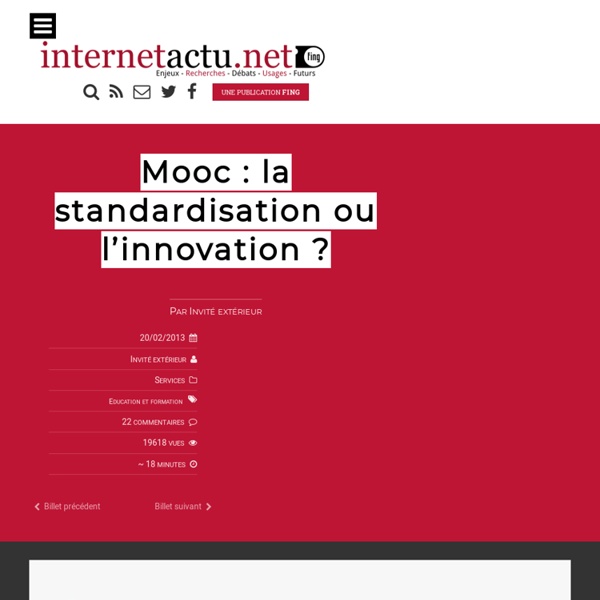



http://www.internetactu.net/2013/02/20/mooc-la-standardisation-ou-linnovation/
MOOCs must be open in both enrollment and licensing Image by opensource.com MOOCs—or Massive Open Online Courses—have been getting a lot of attention lately. Just in the last year or so there’s been immense interest in the potential for large scale online learning, with significant investments being made in companies (Coursera, Udacity, Udemy), similar non-profit initiatives (edX), and learning management systems (Canvas, Blackboard). The renewed interest in MOOCs was ignited after last year’s Introduction to Artificial Intelligence course offered via Stanford University, when over 160,000 people signed up to take the free online course. The idea of large-scale, free online education has been around for quite some time. Some examples include David Wiley’s 2007 Introduction to Open Education; Connectivism and Connective Knowledge, led by George Siemens and Stephen Downes in 2008; Open Content Licensing for Educators; and many others.
Let Them Eat MOOCs - Gianpiero Petriglieri One late afternoon last spring I received a visit from a former student and budding entrepreneur. I usually schedule these meetings at the end of the workday. It feels like a treat, witnessing aspiration and insight blend into leadership to create something new.
What is the theory that underpins <em>our</em> moocs? If you’re even casually aware of what is happening in higher education, you’ve likely heard of massive open online courses (MOOCs). They have been covered by NY Times, Chronicle of Higher Education, TV programs, newspapers, and a mess or blogs. While MOOCs have been around since at least 2008, the landscape has changed dramatically over the past 10 months. In this timeframe, close to $100 million has been invested in corporate (Udacity) and university (EDx and Coursera) MOOCs . And hundreds of thousands of students have signed up and taken these online course offerings. Personally, I’m very pleased to see the development of Coursera and EDx.
Are we already entering a post-MOOC era? The introduction of MOOCs (Massive Open Online Courses) a couple of years ago prompted a heady mixture of excitement, panic, and scepticism. MOOCs simultaneously promised: To open up education to millions across the world who, for either geographical or financial reasons, would never have been able to access it otherwise;To be incredibly disruptive – for professors, bricks-and-mortar campuses, and revenue streams;To be very limited in scope, with no clear business or monetisation plan behind them, no credits attached to courses or degrees, and no sense of how a free, non-credited achievement would stack up in the real world of work.
LEARNING INNOVATION COMPETENCES THROUGH BOUNDARY CROSSING IN A SOCIAL LEARNING ENVIRONMENT - IATED Digital Library In all areas of knowledge creation, the demand for a broader perspective is increasing. The modern world faces issues and challenges, which are becoming more and more difficult to address within the framework of a single method, be that a discipline or a profession. A boundary crossing approach for instance in problem solving, service or product creation, research or organizational team work enhances creativity, and new previously unthinkable innovations are more likely to occur. Clément Delangue présente Open the 25 best classes of the world The project Update 22-11-12 One and a half days ago, we were about to give up in this operation. And one of our mentors challenged us to try it anyway.
MOOCs: Top 10 Sites for Free Education With Elite Universities MOOC stands for Massive Open Online Courses. Although there has been access to free online courses on the Internet for years, the quality and quantity of courses has changed. Access to free courses has allowed students to obtain a level of education that many only could dream of in the past. 20 strategies for learner interactions in mobile #MOOC Let's be honest, we all LOVE research *grin*, or facts, or lists, or useful practices ... or practical strategies for that matter. Well, here is a new set of useful strategies for mobile MOOCs, I hope you like it! In my latest research I focused on the impact of mobile access on learner interactions in a MOOC (Massive Open Online Course).
Will MOOCs change how professors handle the classroom? Buried in all the hype about MOOCs is a somewhat surprising admission by some of the world's leading universities – that their teaching methods may not be very good. [This is an article from The Chronicle of Higher Education, America’s leading higher education publication. It is presented here under an agreement with University World News.] Lectures are the norm for introductory courses at colleges worldwide, from large research universities to local community colleges. But there's a growing sense that monologues by professors are of limited effectiveness for many of today's students.
Seven Steps for Using More Rich Media in Learning Many of the best tips for creating rich, engaging digital assets for learning come from sources that are probably not first-of-mind for most learning designers or IDs, much less trainers, professors, or instructors. Case in point: My so-called seven steps for ramping up the engagement level in digital learning assets, below, are a thinly disguised version of a comparable list that appeared in today's eMarketer FYI newsletter. In an ad for Adobe's Scene7 platform, no less. Do you even know about Adobe Scene7? You probably do if you are a sales and marketing professional, but I would be surprised if many elearning or education professionals did.
The Scoop on MOOCs With the Chronicle of Higher Education’s recent story, “MOOC Mania,” even more people are talking about MOOCs, or Massive Open Online Courses – and a lot of this dialogue is happening right here on www.hastac.org. Check out the links below for insightful posts on MOOCs and how to use them to revolutionize teaching and learning. From Cathy Davidson: From other HASTAC contributors: